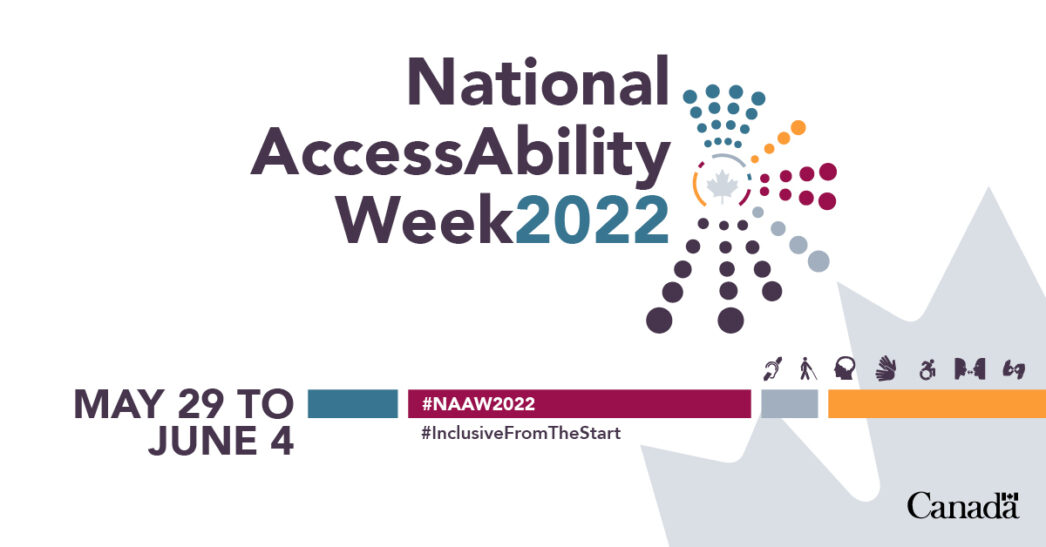May 29 to June 4 is National Accessibility Week (NAAW). This week celebrates the valuable contributions and leadership of Canadians with disabilities while highlighting the work of all those involved who are removing barriers. The theme for this year is “Inclusive from the Start”, focusing on the ongoing efforts to become a better, more accessible and inclusive Canada.
Disability in Canada
According to the 2017 Canadian Survey on Disability, more than 6 million Canadians aged 15 and over identify as having a disability, and the actual numbers are likely higher. In fact, the number of people with a mental health disability increased during the pandemic.
Approximately 4% of Canadians, or more than 1.5 million people, have Fetal Alcohol Spectrum Disorder (FASD). FASD is a lifelong disability which impacts the brain and body of people exposed to alcohol in the womb. Each person with FASD has the right to supports and services that make health care, education, employment, housing, community initiatives, and social connection accessible. But this often not the reality.
How Disabilities impact Canadians
When unsupported, people with disabilities experience challenges. Only 59% of Canadians with disabilities aged 25 to 64 are employed compared to 80% of Canadians without disabilities. Persons with disabilities earn less than Canadians without disabilities and are more likely to live in poverty.
These challenges are especially true for those with FASD, who often experience high rates of unstable housing, contact with the criminal justice system, challenges in education, and unstable employment.
However, this can change with the right supports and services. An uninformed workforce can’t effectively support people with FASD in areas like education, employment, and housing. When professionals in these areas are appropriately trained, however, we can start to move towards healthy outcomes.
Celebrating Abilities
Part of supporting those with FASD and reducing barriers is focusing on their strengths, talents, and abilities. Concentrating on their deficits and needs can cause feelings of shame, suffering and victimization, adding to the stress and stigma that often is experienced by these individuals and their families.
Studies have revealed the intrinsic strengths of individuals with FASD, including strong self-awareness, receptiveness to support, capacity for human connection, perseverance through challenges, and hope for the future. More research is needed to further study the strengths of those with FASD and their families to be able to support them better, but it’s important to take the time to recognize and celebrate the things we’re good at.
Here are some resources that we can use to start to reframe how we talk about disabilities and focus more on the barriers in our society that impact success.
- Accessible Canada Report “Creating new federal accessibility legislation: What we learned from Canadians”
- Research Article “Balancing the story of fetal alcohol spectrum disorder: a narrative review of the literature on strengths“
- StatsCAN Plus Article “Better understanding the needs of Canadians with disabilities”
- Eh Sayers podcast episode “Talk about the barriers, not the disability: Activity limitations and COVID-19”
Inclusive From the Start
How can we begin to break down barriers to equity for those with FASD? Here are some resources to help get started:
- Learn more about FASD and how best to support individuals with this disability in your profession through online learning
- Urge government leaders to commit to Canadians with FASD by developing a National FASD Strategy
- Change how we talk about FASD to reduce the stigma and challenge stereotypes about this disability
- Tell our leaders about your experiences. The following surveys have recently been completed or are upcoming to collect information about your experiences. The data collected in these surveys are used by leaders and decision makers to create inclusive and accessible programs and policies for all Canadians.
-
- Canadian Survey on Disability (CSD) provides information about youth and adults whose everyday activities are limited due to a long-term condition or health-related problem. Collection for the 2022 CSD will begin in early June
- Business ownership among persons with disabilities in Canada (January 2022)
- Survey on Savings for Persons with Disabilities (April 2022)
By focusing on strengths and abilities, we can eliminate stigma, remove barriers, and provide inclusive atmospheres for all Canadians. Join CanFASD and the rest of Canada this week as we work towards an inclusive and accessible country for everyone.

